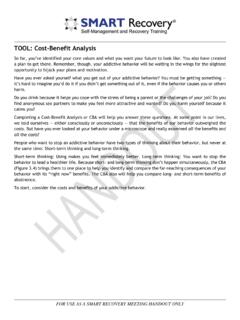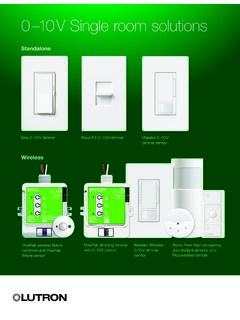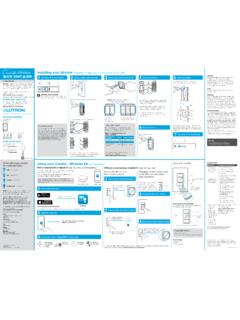Transcription of Relapse vs. Lapse Handout - SMART Recovery San Diego
1 The Truth About Relapse : 5 Misconceptions ExplainedMary was in Recovery struggling with cocaine addiction. She was still under quite a bit of stress due to legal issues from her cocaine abuse, problems at work, and issues at home. As a way to cope with her stress, she decided to try drinking alcohol. She reasoned that since she only had a problem with cocaine, her drinking would not be a sign of Relapse . She did not discuss this decision with her only a few short weeks Mary was using cocaine again. She wound up losing her job, resulting in even more legal problems. Mary was totally heartbroken. She felt that even after six months of Recovery from cocaine abuse, her treatment was now a total failure and all of her progress was is a major problem in Recovery and many people will have to deal with one or more relapses. As you might expect, there are many misconceptions as to what a Relapse is and what having a Relapse means. This article will discuss what a Relapse is and the misconceptions surrounding Relapse in vs.
2 Relapse : There is a major difference between having one slip and having a Relapse . A Lapse represents a temporary slip or return to a previous behavior that one is trying to control or quit (usually a onetime occurrence), whereas a Relapse represents a full-blown return to a pattern of behavior that one has been trying to moderate or quit altogether (Marlatt & Donovan, 2005). If someone is on a diet and trying to lose weight, they might have a Lapse if they eat one piece of chocolate cake. If that same person gains 25 pounds while on their diet, they most likely suffered a are several misconceptions associated with the notion of a Relapse in Recovery from substance abuse or addiction. Here are five of the most common Relapse misconceptions explained.#1: All People with Substance Use Disorders Relapse rates in Recovery are high, it is not inevitable that every recovering addict will experience a Relapse , and Relapse is not unique to people with substance use disorders.
3 -RUDOLPH C. HATFIELD This misconception can lead to self-fulfilling prophecy for someone in Recovery . While it is true that there are a high number of individuals in Recovery that do experience Relapse , it is not true that Relapse is inevitable. Figures by the National Institute of Drug Abuse (2008) indicate that the Relapse rates for Recovery from an addiction (between 40 and 60 percent) are similar to the Relapse rates for trying to change behaviors associated with many chronic physical conditions, such as hypertension and diabetes (between 30 and 70 percent). What these figures indicate is that changing behaviors that are habitual and enjoyable to an individual, even if these behaviors are potentially damaging, is quite difficult. Thus, while Relapse rates in Recovery are high, it is not inevitable that every recovering addict will experience a Relapse , and Relapse is not unique to people with substance use disorders.#2: You Can Only Relapse by Using Your Drug of ChoiceIf you believe this misconception, you are setting yourself up for potential problems during Recovery .
4 Most professional addiction counselors have come to realize that the Relapse really begins to form well before the person actually begins taking a drug again. People most often Relapse as a result of being exposed to stress or other high risk situations and do not use or have difficulty using the coping methods they learned in Recovery (see Marlatt & Donovan, 2005). A Relapse in addiction is a result of a return to an old way of thinking and behaving that was originally dysfunctional for the person. A person who switches from cocaine to alcohol is not addressing their dysfunctional behavior and the issues that helped shape that behavior, but instead they are simply substituting one dysfunctional coping method for another one.#3: Those Who Relapse Lack MotivationThis is a common misconception that friends or family members of people in Recovery often believe. Many clinicians who treat substance use disorders consider Relapse to be a part of the Recovery process for those individuals that experience it.
5 Someone working towards a very difficult goal will often experience numerous failures before they reach that analogy, Thomas Edison often stated that he failed over 1,000 times before he finally developed a working light bulb. That type of fortitude can only be maintained by a person that is highly motivated to succeed. The process of Recovery is very difficult and rarely runs smoothly. While it is not true that everyone in Recovery relapses, it is also not true that Relapse represents a lack of motivation on the part of individual. It requires a great deal of motivation to move past the Relapse and continue with one s Recovery Edison often stated that he failed over 1,000 times before he finally developed a working light bulb. That type of fortitude can only be maintained by a person that is highly motivated to succeed. -RUDOLPH C. HATFIELD #4: Relapse Means Treatment Has FailedSince Recovery is a process and often requires many adjustments to a person s way of thinking, behaving and feeling, there is no reason to believe that a Relapse is a sign of treatment failure.
6 What it does mean is that the Recovery program needs an adjustment in order to make it more effective. This is not the same thing as saying one must Relapse in order to develop the best Recovery plan for them, but instead that Relapse can be a sign that improvements and adjustments need to be made in the Recovery plan.#5: When Relapse Occurs All Progress is LostThis misconception is fueled by many stereotypic depictions in the media where a person experiences a Relapse and immediately goes back to being a hopeless addict. If we view Relapse as the result of a mistake or oversight in one s Recovery plan then we can also view Relapse as an opportunity to learn. This is not to say that one must Relapse in order to learn, but one can learn from the conditions that led to the best way for a person to minimize the chances of experiencing a Relapse is to proactively prepare for the possibility that a Relapse will occur. Often this requires a collaborative effort between the person, treatment providers, and friends and family members.
7 However, Relapse is not inevitable and the majority of people that experience a Relapse can learn from it and move on.



